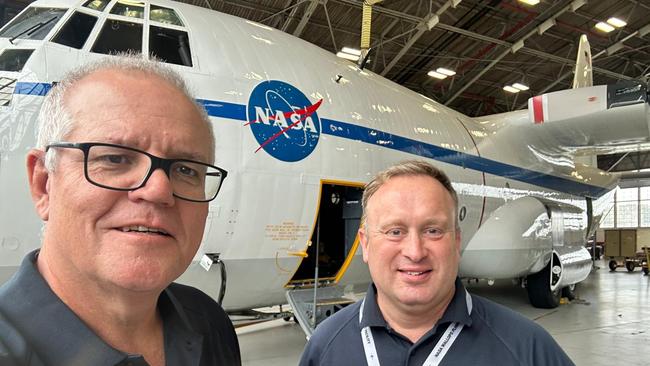AUKUS in space: Scott Morrison proposes ‘Pillar 3’ for defence pact
Scott Morrison has proposed expanding the AUKUS security partnership through a ‘Pillar 3’ initiative that he says will enhance deterrence and make Australia a more valuable ally.

Scott Morrison – the founder of the landmark AUKUS agreement – has proposed taking the security partnership into the space domain to bolster its effectiveness as a military deterrent and make Australia a more valuable ally.
The former prime minister said he would support a new AUKUS “Pillar 3” aimed at helping Australia develop a stronger space capability that could complement US, Japanese, as well as European and UK systems.
This would bolster deterrence, with Mr Morrison noting that space was “now a frontline in US-China strategic rivalry.” But he also said it would send a valuable signal to the private sector about the important role it had to play.
“The blurred lines between civil and military domains created by the dual use space technologies makes this even more challenging to contest,” he said.
AUKUS – the trilateral security partnership between Australia, the UK and the US – offered a chance to harness the power of the private sector in the space domain to “deliver strategic advantage over potential adversaries.”
In a speech to the 2025 Australian Space Summit in Darling Harbour on Tuesday, Mr Morrison said that “Australia can and must stand out as a rising actor with the potential to plug important holes in allied capabilities.”
He warned that China was “advancing, especially in satellite manoeuvrability, launch, and spaceplane tech,” while Russia was “reportedly developing a space-based nuclear anti-satellite weapon.”
As space became “more enmeshed in geopolitical rivalry,” Mr Morrison said the allied network needed to function as a “cohesive whole, just as it has in all other domains for decades.”
“By 2030, with deliberate development, Australia can offer unique contributions: southern-hemisphere sensors watching the skies, a strategic location for space operations, and additional resilient satellites and launch options,” he said.
“An allied operation in the Indo-Pacific in 2030 could count on Australian satellites for communications and surveillance, Australian sensors to warn of enemy ASAT (anti-satellite weapon) moves, and even Australian launch pads to rapidly deploy new assets,” he said.
“All of this augments the strengths of the US, Japan, and Europe/UK, creating a more robust collective space posture that deters aggression.”
Mr Morrison said that a “strong argument can also be made that such initiatives could form the basis of Australia’s contribution to a new Pillar 3 for AUKUS which, as its founder, I would strongly support.”
The AUKUS agreement – unveiled in September 2021 – has two main pillars. The first would help Australia acquire its own fleet of conventionally armed, nuclear powered submarines. The second allows for the development and sharing of highly advanced technologies and capabilities between the UK, the US and Australia.
Mr Morrison told The Australian in 2024 that Pillar 2 was the “reason for AUKUS” – to create “a single defence industrial base ecosystem between the three jurisdictions (US, UK and Australia) where there’s less regulation, there’s greater integration, there’s more innovation”.
Speaking just weeks after the 2025 election result in Australia, Mr Morrison said on Tuesday that it was important for both sides of politics to “make the strategic case for a bipartisan commitment to space, driven by our national interests – just like intelligence, security and defence.”
The former prime minister has a deep interest in turning Australia into a major player in the space domain. He currently serves as the non-executive chairman of Space Centre Australia which is aiming to open a major international space port in Cape York in Northern Queensland.
Space Centre Australia recently inked its first agreement with NASA for a “horizontal launch capability” allowing a rocket to be deployed in mid air from a C-130 Hercules military transport plane, delivering a payload into a low Earth orbit.
Speaking on Tuesday, Mr Morrison sketched out his vision for “multi user private space port near Weipa,” likening it a “Cape Canaveral at Cape York.”
“There is no other space port in a secure jurisdiction planned or existing, at this scale, closer to the equator,” he said.
In his address on Tuesday, Mr Morrison said that management consulting firm McKinsey had estimated that the global space economy was now worth US$630bn and would grow 9 per cent annually to US$1.8 trillion by 2035 – “double the growth rate of the global economy and faster than semiconductors.”




To join the conversation, please log in. Don't have an account? Register
Join the conversation, you are commenting as Logout